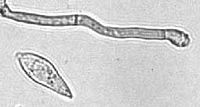
Photo from wikipedia
Introduction The contrasting soil management in flooded-transplanted rice (Oryza sativa) and dry-tilled wheat (Triticum aestivum) poses a challenge for improving low nitrogen use efficiency (NUE) of the rice-wheat system. Integration… Click to show full abstract
Introduction The contrasting soil management in flooded-transplanted rice (Oryza sativa) and dry-tilled wheat (Triticum aestivum) poses a challenge for improving low nitrogen use efficiency (NUE) of the rice-wheat system. Integration of organics in nutrient management can bring in changes favoring efficient N uptake via changes in growing conditions and soil responses. Materials and methods This study reported the results of a 15-year-long experiment on integrated nutrient management (INM) systems for rice-wheat cropping. The INM included substituting ~50% of chemical fertilizers via (i) including a legume crop (Vigna radiata) in the sequence and its biomass incorporation (LE), (ii) green manuring with Sesbania aculeata (GM), (iii) farmyard manure application (FYM), (iv) 1/3 wheat stubble in situ retention (WS), and (v) 1/3 rice stubble in situ retention. Results and Discussion The INM strategies resulted in improved NUE compared to 100% chemical fertilizers (F). The INM had significantly higher net N mineralization and improved biological activity aligning with the NUE trends. The reductions in redox potential (Eh) and pH during rice season improved NUE under integrated management. Highly reduced conditions favored N mineralization and plant availability in form of NH 4 + − N resulting in enhanced uptake efficiency, in rice crop. The soil organic carbon (C) significantly increased in INM, and an effect of the active C fractions was evident on the NUE of the wheat crop. Conclusion The results showed that these INM strategies can immensely benefit the rice-wheat system via improvement in biological health along with electrochemical changes for flooded rice, and labile-C-assisted improvement in soil conditions for wheat.
Journal Title: Frontiers in Plant Science
Year Published: 2023
Link to full text (if available)
Share on Social Media: Sign Up to like & get
recommendations!